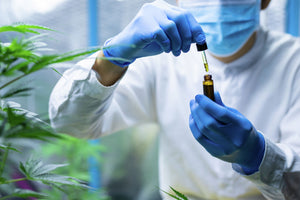Think Higher
Gold Spectrum & TNHAA: Protecting Tennessee’s Hemp Industry
At Gold Spectrum, we believe in the power of hemp—not just for its incredible benefits, but for the livelihoods it sustains across Tennessee. That’s why we’re proud to partner with the Tennessee Healthy Alternatives Association (TNHAA) to raise awareness and secure funding in the fight against harmful legislation threatening our state’s hemp industry.
Read more
Tinctures: An Underrated option for Cannabis Consumers
Discover why cannabis tinctures are the most underrated consumption method. Learn about their benefits, from precise dosing to fast-acting relief, and why you should try them today!
Read more

Jan 3, 2025
Customer Account Upgrades
We’re thrilled to announce an upcoming change that will make your shopping experience at Gold Spectrum even more seamless and secure. We will be transitioning from Shopify Legacy customer accounts to Shopify’s new customer account system. This upgrade is designed with you in mind, bringing improved features and functionalities without altering your current account information.
Read more
An Update on the fight to save THCa In Tennessee
As of Monday, 12/23/2024, a temporary injunction has been issued in our lawsuit against the Tennessee Dept. of Agriculture involving the potential ban of THCa in the state of Tennessee, effectively restricting the law from taking place until 02/18/2025.
Read more
An update to the status of legal THCa in Tennessee
Yesterday, 12/18/2024, Gold Spectrum, The Smoky Grass Station, and the Tennessee Growers Coalition met with some of our local media providers at Channel 5 WCYB to discuss the pending legal status changes to THCa and Hemp Products in the state of Tennessee.
Read more
The Tantalizing Theater of Taste, Terpenes, and Technology.
The Importance of Hemp-Derived Terpenes in Cannabis Concentrate Products
In the world of cannabis concentrates, flav...
Read more
Gold Spectrum 2024 Holiday Gift Guide
The Gold-Spectrum 2024 Holiday Gift Guide: Exclusive Picks for Cannabis Lovers
Spread joy this holiday season with p...
Read more

Dec 2, 2024
Buzz-Worthy Games
In this guide, we'll explore the best games to play while you're feeling elevated, divided into four sections: solo games, games to play with friends, video games, and tabletop role-playing games (TTRPGs). So, roll up, light up, and let's get into it!
Read more

Nov 22, 2024
High on Turkey: How Tryptophan and THC can elevate your holiday experience
Compounds like tryptophan, found in turkey, and cannabinoids, especially THC and CBD, have profound effects on your brain and body. Together, they can make your Thanksgiving feel extra cozy, relaxed, and blissful.
Read more

Nov 15, 2024
Pies & Highs: Our Holiday Edible Guide
let’s explore the differences between eating edibles on a full stomach and eating edibles on an empty stomach, and how to enjoy them best this Thanksgiving!
Read more

Nov 7, 2024
Decoding Your Full-Panel COA: A Simple Guide to Understanding Cannabis Lab Reports
Why a COA is Essential for Ensuring the Quality and Safety of Your CBD Products
While reading a Full-Panel COA may se...
Read more
THCP vs. THC: Understanding the New Cannabinoid and Its Potency
What Is THCP?
THCP, or tetrahydrocannabiphorol, is a naturally occurring cannabinoid that was first di...
Read more









